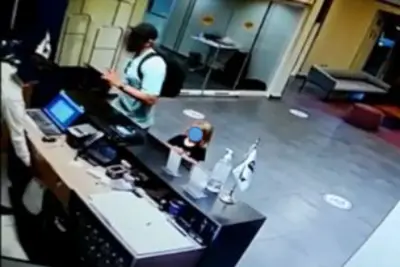Judge orders involuntary medication of California conspiracy theorist charged with killing his 2 kids in Mexico

A San Diego federal judge has ordered prison personnel to involuntarily medicate a conspiracy theorist charged with killing his two young children in Mexico in an attempt to restore his competency to stand trial However U S District Judge Cathy Bencivengo issued an immediate stay of her order to allow Matthew Taylor Coleman s defense unit to appeal the ruling to the th U S Circuit Court of Appeals RELATED Enlightened by QAnon California man charged with spear-gun killing of his children in Mexico Coleman a -year-old Santa Barbara surf school owner who allegedly killed his infant and toddler in while paranoid and obsessed with QAnon and other conspiracy theories was ascertained in late to be mentally incompetent to stand trial Federal prosecutors have sought permission over the past year to medicate Coleman involuntarily in order to restore his mental competency which the U S Supreme Court has ruled is legal under certain conditions though several of the specific arguments for and against the medication plan have been filed under seal An undated photo of Matthew Taylor Coleman Dara and Austin Photography Coleman s defense gang filed a notice of appeal on Friday a day after Bencivengo s ruling His attorneys did not respond Monday to messages seeking comment on the ruling or their appeal Coleman has pleaded not guilty to federal charges of murdering U S nationals on foreign soil for the slayings of his -year-old son Kaleo and -month-old daughter Roxy Officials allege that in August Coleman drove the children to Mexico and shot them with a spearfishing gun Their bodies were discovered in a ditch off a Rosarito highway According to court records Coleman has admitted to the killings in detailed confessions during law enforcement interviews and his wife advised investigators that the couple had delved into the sprawling QAnon conspiracy together Coleman eventually became paranoid by a mix of conspiracy theories even believing that his wife had passed serpent blood from lizard people on to their children according to the court records In Bencivengo ruled Coleman was not competent to stand trial and ordered him to be committed for remedy Bureau of Prisons records show he remains in custody at a federal biological prison facility in Missouri Greater part of the court records regarding his competency remain sealed but prosecutors wrote in a filing last year that Coleman was committed because evidence suggested he has a mental infection or defect and cannot understand the proceedings or help his defense A prison professional who evaluated Coleman for weeks last year thinks he meets the criteria for Unspecified Schizophrenia Spectrum and Other Psychotic Disorder and is not competent to proceed or make decisions in his scenario the prosecutors wrote Coleman did not participate in the evaluations Citing the prison medical practitioner s statement prosecutors wrote last year that this is a chronic condition that apparently will not remit without antipsychotic medication The ruling body attorneys also wrote that while in custody in Coleman cut himself with a razor dove headfirst into a toilet punched himself in the face and slammed his head into the floor Despite those incidents an administrative hearing officer from the Bureau of Prisons ruled Coleman was not a danger to himself or others and decided not to medicate Coleman under a different law Related Articles South San Francisco cops shoot kill armed man Suspect arrested in pattern of burglaries across Bay Area Inmate dies at Main Jail in San Jose San Jose man arrested on suspicion of attempted murder Welcome to the anabolic club Trial opens for former East Bay cop accused of peddling steroids Bencivengo made her ruling last week during what s known as a Sell hearing so-named for the U S Supreme Court s landmark decision in Sell v United States that held that the federal authorities can administer antipsychotic drugs to a defendant under certain limited circumstances According to that ruling judges must find that four requirements are met before involuntarily medicating a defendant The first has to do with whether fundamental executive interests are at stake The other three requirements deal with the medication itself and determining whether cure will be effective whether there are any alternative and less-intrusive treatments available and whether the administration of the drug is medically appropriate Bencivengo ruled the executive met all four requirements but now the th Circuit will evaluate the affair

